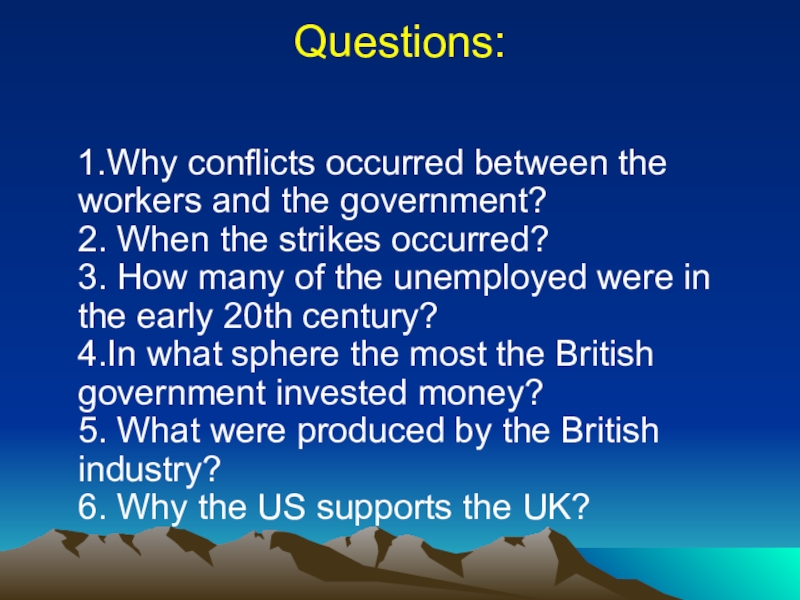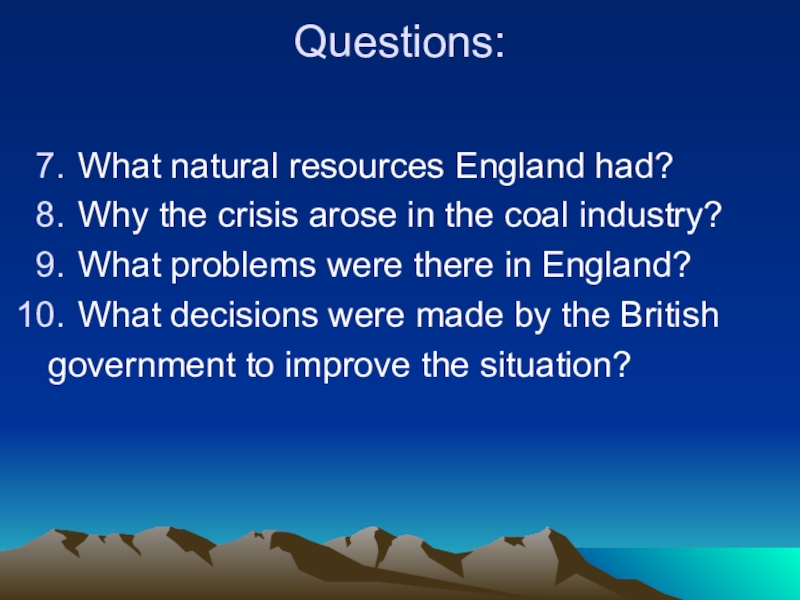- Главная
- Разное
- Образование
- Спорт
- Естествознание
- Природоведение
- Религиоведение
- Французский язык
- Черчение
- Английский язык
- Астрономия
- Алгебра
- Биология
- География
- Геометрия
- Детские презентации
- Информатика
- История
- Литература
- Математика
- Музыка
- МХК
- Немецкий язык
- ОБЖ
- Обществознание
- Окружающий мир
- Педагогика
- Русский язык
- Технология
- Физика
- Философия
- Химия
- Шаблоны, фоны, картинки для презентаций
- Экология
- Экономика
Презентация, доклад на тему Великобритания после Первой Мировой войны, включая вопросы на понимание прочитанного
Содержание
- 1. Великобритания после Первой Мировой войны, включая вопросы на понимание прочитанного
- 2. The situation after the war
- 3. Decline and depressionAfter the war came a
- 4. Questions: 1.Why conflicts occurred between
- 5. England – commercial and industrial country.
- 6. Questions: What natural resources England had?Why the
- 7. Internal development • 1918 – extension
- 8. The British EmpireThe most important colonies were
- 9. Questions 12. List the most important
- 10. The Problem Of Ireland. • The metropolis
- 11. Questions 17. What was the problem
- 12. Foreign policy • Achieving balance in
- 13. England through the eyes of British and
- 14. Questions 23. What traits the English
The situation after the war • 1. Unemployment • 2. The loss of economic supremacy in the country • 3. The US house • 4. The loss of leadership in
Слайд 2
The situation after the war
• 1. Unemployment
• 2.
The loss of economic supremacy in the country
• 3. The US house
• 4. The loss of leadership in Finance
• 5. Shrinking market
• 6. Main advantages – the merchant fleet and foreign investment
Слайд 3Decline and depression
After the war came a decline in the economy
and society of Britain. During the war the government was forced to raise taxes from 6% to 25% of the revenue to expand the state apparatus. This inevitably led to conflicts between workers and government. In the early 20-ies in the country, a wave of strikes, which the government suppressed by force. In addition to domestic troubles, the UK economy suffered greatly from the "great depression". Between 1930 and 1933, the country had three million unemployed.
In Germany, the damage from the depression was even more noticeable, which destroyed the second in importance for the UK market.
In 1931 the British government refused to pound.
In the 30 years the UK economy has started to improve, mainly because in the air the threat of a new war. The government armed and invested in heavy industry. By 1937 British industry was producing weapons, aircraft and military equipment with the financial assistance of the United States.
Слайд 4Questions:
1.Why conflicts occurred between the workers and the government?
2.
When the strikes occurred?
3. How many of the unemployed were in the early 20th century?
4.In what sphere the most the British government invested money?
5. What were produced by the British industry?
6. Why the US supports the UK?
Слайд 5England – commercial and industrial country.
Problems with food
was huge.. as the supply of food barely enough for half a year..
England had only coal, fabric and machines to exchange for its interesting products such as: iron ore, timber and cotton.
The economic problems were intensified by the shortage of liquid fuels and electricity. The use of coal as an energy source became less effective.
The crisis in the coal industry appeared due to the construction of modern power plants..
Problems in the UK was so much that even the closure of mines and the reduction of wages was not helpful for her.. But these decisions were necessary because the coal industry was in crisis..
Слайд 6Questions:
What natural resources England had?
Why the crisis arose in the coal
industry?
What problems were there in England?
What decisions were made by the British
government to improve the situation?
What problems were there in England?
What decisions were made by the British
government to improve the situation?
Слайд 7Internal development
• 1918 – extension of voting rights
• Preserved the two-party system: the conservatives and labour
Слайд 8The British Empire
The most important colonies were India, Canada, Australia, New
Zealand, large areas in the Sudan, Eastern and southern Africa, as well as a number of Islands in the Pacific Ocean. Canada, South Africa, Australia and New Zealand achieved the status of the dominions, involving its own Parliament, government, judicial system and legislation. Egypt, Yemen, Saudi Arabia and Iraq gained independence.
The Statute of Westminster, adopted in 1931 parliaments were allowed the contradictions between the metropolis and the outskirts of the Empire. Statute of the United Kingdom and the dominions within the British allegiance to the English monarch.
The Statute of Westminster, adopted in 1931 parliaments were allowed the contradictions between the metropolis and the outskirts of the Empire. Statute of the United Kingdom and the dominions within the British allegiance to the English monarch.
Слайд 9Questions
12. List the most important colony of the British
Empire?
13. Which countries have the status of the dominions?
14. Which countries won independence?
15. When was the Statute of Westminster?
16. How important was the adoption of the Statute of Westminster?
Слайд 10The Problem Of Ireland.
• The metropolis had a serious problem
with fighters for the independence of India and Ireland.
Ireland sought independence from Britain for several centuries. In 1914, a law was adopted on the autonomy of Ireland, but, owing to the outbreak of the First World War, its implementation was postponed. So the Irish began an armed struggle for independence. In 1921, the government signed an agreement giving Ireland dominion status (except for the Northern part of the island). The Sinn FEIN demanded complete independence of Northern Ireland and reunite with the rest of Ireland.
• In December 1937 after nationwide voting Catholic part of the country proclaimed Ireland an independent Republic. The Northern part of Ireland remained part of the Kingdom.
Слайд 11Questions
17. What was the problem of Ireland?
18. In what
year was adopted the law on the autonomy of Ireland?
19. Why the Irish fought for independence?
20. What happened with Ireland in 1921?
21. In what year did Ireland become an independent Republic?
22. what happened to Northern Ireland?
Слайд 12Foreign policy
• Achieving balance in Europe
• The
fight against communism
• Contradictory attitude to Germany
Слайд 13England through the eyes of British and other peoples.
• England
has lost its leading position in the global economy, Finance and politics. The British believed that in the UK, to decide the fate of the world does not even reckon with the fact that their voice is not determinant in the organization of the world order.
• In the cross-cultural books have been written: "the British educated, very durable and hard-working. They love their home and stubbornly hold to old traditions". A distinctive feature of English conservatism was.
• England could not be considered a backward state. It has achieved in the interwar period, outstanding achievements in science (chemistry and physics), technology (radio and television), as well as in literature and cinema.
Слайд 14Questions
23. What traits the English has got according to
the opinion of others peoples?
24. In what areas of England have succeeded in peacetime?



















